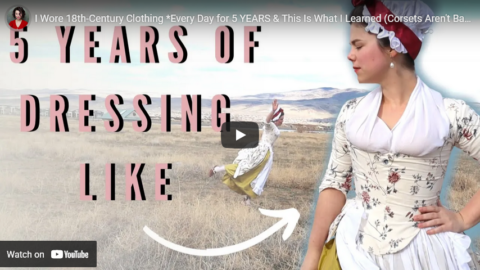I would like to report other evidence that mathematics is only patterns. When I was at Cornell, I was rather fascinated by the student body, which seems to me was a dilute mixture of some sensible people in a big mass of dumb people studying home economics, etc. including lots of girls. I used to sit in the cafeteria with the students and eat and try to overhear their conversations and see if there was one intelligent word coming out. You can imagine my surprise when I discovered a tremendous thing, it seemed to me.
I listened to a conversation between two girls, and one was explaining that if you want to make a straight line, you see, you go over a certain number to the right for each row you go up – that is, if you go over each time the same amount when you go up a row, you make a straight line – a deep principle of analytic geometry! It went on. I was rather amazed. I didn’t realize the female mind was capable of understanding analytic geometry.
She went on and said, “Suppose you have another line coming in from the other side, and you want to figure out where they are going to intersect. Suppose on one line you go over two to the right for every one you go up, and the other line goes over three to the right for every one that it goes up, and they start twenty steps apart,” etc. – I was flabbergasted. She figured out where the intersection was. It turned out that one girl was explaining to the other how to knit argyle socks. I, therefore, did learn a lesson: The female mind is capable of understanding analytic geometry. Those people who have for years been insisting (in the face of all obvious evidence to the contrary) that the male and female are equally capable of rational thought may have something. The difficulty may just be that we have never yet discovered a way to communicate with the female mind. If it is done in the right way, you may be able to get something out of it.
Richard Feynman, “What is Science?”, Richard Feynman [presented at the fifteenth annual meeting of the National Science Teachers Association, 1966 in New York City, and reprinted from The Physics Teacher Vol. 7, issue 6, 1969].
December 30, 2021
QotD: Richard Feynman discovers (to his shock) that females can understand analytic geometry
December 3, 2021
Australian-American War of 1942 – The Battle of Brisbane
World War Two
Published 2 Dec 2021America shares a language and large parts of its culture with Britain and Australia. But when tens of thousands of US troops arrive in 1942, things will be far from smooth. While the alliance remains firm, their soldiers will spend almost as much time fighting each other as they do the Axis.
(more…)
November 19, 2021
I Wore 18th-Century Clothing *Every Day for 5 YEARS & This Is What I Learned (Corsets Aren’t Bad!)
Abby Cox
Published 10 May 2020I wore 18th-century women’s clothing, all day, 5 days a week, for 5 years of my life. Over those 5 years, I learned *a lot* about my body, fashion in the 1700s — the good and the not so good, and how we can take these lessons and improve modern fashion.
***Trigger Warning: I do talk about body image in this video (as a reflection of my own, long, long journey with my own body & how wearing historical clothing has given me a different perspective on body image) which may or may not be upsetting for some. ***
*Ok, so not “every day” but you get the idea…
Business Inquiries *ONLY* abbycox@semaphorebrands.com
(This email goes directly to my management and not to me.)More Videos:
Answering YOUR FAQs from THIS Video: https://youtu.be/SN3agbKZVP0
“Becoming an 18th-Century MEME LORD” https://youtu.be/a0pRE3uXWu8
“Historical Costumers and Their Hogwarts Houses” https://youtu.be/vxmRsc9Qj8M
Rachel Maksy – “Born in the Wrong Era” – https://www.youtube.com/watch?v=r5GAJ…A lot of these photos of me were taken by the lovely Fred Blystone. You can see more of his photography here: https://www.facebook.com/groups/13664…
Also, @Edwardian Tailor (https://www.youtube.com/channel/UCBSf…)
We like to assume that the people in the past are “stupid” (it’s normal human behavior), and one of the ways that we, as a modern society, do this is by judging the past for their fashion trends and practices. We’ve been taught to demonize corsetry (or in this case, stays) for being restrictive and a tool of oppression towards women, and take pride in our culture of diet and exercise, without considering the issues that can be found in our body-obsessed culture. We praise jeans and a t-shirt, as being “comfortable” but the insecurities that so many of us have about our bodies are put on display in our 21st-century uniforms. We take for granted our modern homes, and how that has made us lazy in dressing for the seasons, resulting (in part) the loss of various types of textiles and weaving technology. I learned a lot over those 5 years, including how to indulge in an Indian Buffet while wearing my 18th-century stays, and I’m excited to share my insights with you. Also, can we just discuss how stupid modern underwear is??
Images Used:
*Summer Dresses, 1783, Object Number – J,5.139, Asset Number – 79588001 © The Trustees of the British Museum. https://www.britishmuseum.org/collect…
*Sheer Cottton Mull Italian Gown, 1780s, The Metropolitan Museum of Art, 17.107.6a, b, https://www.metmuseum.org/art/collect…
*Kofta, 1760s-90s, Nordiska Museet, NM.0186311, https://digitaltmuseum.se/01102369100…
*Women 1790-1799, Plate 052, Fashion Plate from August 1796, The Metropolitan Museum of Art Library Costume Institute Fashion Plate Collection, https://libmma.contentdm.oclc.org/dig…
*Robe a l’anglais c. 1780, The Metropolitan Museum of Art, 1982.291a, b, https://www.metmuseum.org/art/collect…
*Attributed to Isaac Cruikshank, Cestina Warehouse or Belly Piece Shop
April 16, 1793, The Metropolitan Museum of Art, 59.533.475 https://www.metmuseum.org/art/collect…*Stays, The Metropolitan Museum of Art,
2009.300.3330a–d
https://www.metmuseum.org/art/collect…*The Bum Shop, Attributed to R. Rushworth (British, active 1785–86), July 11 1785, The Metropolitan Museum of Art, 1970.541.12, https://www.metmuseum.org/art/collect…
*Chemise, 1780-1800s, The Metropolitan Museum of Art, 2005.368 https://www.metmuseum.org/art/collect…
*Corset, 1880s, The Metropolitan Museum of Art, 2009.300.3497a–c
https://www.metmuseum.org/art/collect…——-
Music from Epidemic Sound:
“Gold Among the Sand”- Trevor Kowalski
“To Clarity” – Airae
“The Path to Innovation” – Airae
“Caffeinated and Motivated” – Airae
“Alice is on her Way” – Airae
“Cafe Laurent” – Medite
“In a Jiffy” – Moins Le Quartet
“Moonlight Night” – Gabriel Lucas———
Instagrams: https://www.instagram.com/abbyelyn
From the comments:
Abby Cox
1 year ago (edited)Hey Everyone!
Thank you all so much for taking the time to watch this video about my experience! I’ve noticed a lot of the same questions in the comments, so I want to take a minute to answer them here –
UPDATE (Sept 27, 2020) – I’ve answered your questions about menstruation here: https://www.youtube.com/watch?v=iV2TgwjjhOE
UPDATE (June 7, 2020) – I’ve taken the most commonly asked questions from the comments and have done a video to answer them! You can watch it here: https://youtu.be/SN3agbKZVP0
– My stays (18th-century term for a corset) are from https://redthreaded.com/ – they’re a fantastic historical corset company that I adore. (and for the couple of you trying to call me out – my 100% hand-sewn, me-made, reproduction stays are so worn out that they’re in retirement, and just because I can make stays by hand doesn’t mean I have the time. I’d also rather support a small business that I believe in.
Finally, the gown I’m wearing in this video was cut to go over those stays, but if you’d like to see my hand-sewn reproduction stays in action you can buy the book I co-wrote here: https://www.american-duchess.com/book/american-duchess-guide)
– While I haven’t gone down the menstruation research rabbit hole (cause it is its own subject of study) I am going to do my best with limited access to primary source documentation (which is what I really need to be able to answer this question) to produce a video about what 18th-century women would do. I don’t know when this will be, but I will do my absolute best to answer this question, and if I can do some experimental archeology in the process, I will.
(ravenclaws gotta ravenclaw…)
– Thigh chafing – so I think that varies from person to person. I never really had a lot of issues with it (and my narrow hips mean that I will never have a thigh gap) because my linen shift would always kind of end up between my leg and absorb the sweat. However, I know a lot of costumers who will wear split-crotched drawers because they find it more comfortable, even though drawers weren’t a thing in the 18th-century.
Ok! I hope this helps answer some of your questions! Thank you all so much for watching and engaging in this video. I really can’t tell you all how much I appreciate it!

November 18, 2021
QotD: Hormones, puberty, and menopause
… in the early twentieth century, women that made it to positions of prominence, where they became known for professional excellence, had to be GOOD at it. Amazing, in fact.
And even then, they might hit a glass ceiling, because they were the nail that stuck up. Everything conspired to bring them down.
Female liberation was played against this. People looked at these women, knew what they’d achieved against what obstacles, and dreamed that “if only women were allowed to be on an even footing with men, they’d be the best at everything. Every woman would be a leader.”
[…]
Having gone the full ride on the hormonal roller coaster, being a woman built mostly by nature to make more humans, let me tell you, it ain’t easy. The hormonal ramp up of puberty is probably worse for boys, but the monthly ride of women is … interesting. I had years of having really bad pains, which meant if I had a test on one of those days I had to work DESPITE it. How bad? well, neither of my giving-birth experiences were worse, and in fact the second was much milder, until they gave me pitosin (the second started out with pitosin) and then with the ramping up of pain of pitosin, and giving birth in one and a half hours (long story. Let’s say they believed the report on the first birth, which had been doctored (ah!) and should never have given me the d*mn thing) was about the same as I used to endure for two or three days straight. And yes, I studied and took finals under that kind of pain, with no pain killers because most of them just make me more ill and woozy.
Then there were my middle years where I’d get unreasonably angry and borderline-violent for about a week before. It took a lot of engineering my own brain and knowing “this isn’t real, it’s hormonal” to stop myself being hell to live with. And sometimes I didn’t manage it. I’d be in the back of my brain, watching the rest of me rage and go “what the heck? Why am I doing that.”
And then there were various dysfunctions. We won’t go there, because most women don’t get those. But menopause … well … it’s special. I seem to have elided most of it, because I went into it surgically and with a hammer, having everything removed and having to cope, which at least was over in a few months. But I’ve seen relatives and friends go through it: it can stretch to five years of having NO discernible mind. You forget everything, lose everything, can’t sleep, can’t keep commitments, etc. And we still haven’t come up with a replacement that has no bad effects and makes actual sense. We’re trying.
Anyway, so yeah, women are running with their feet in a sack. But most of them are about average for normal human beings. So, yeah, they can do jobs and perform well, despite all of that. What you’re never going to get is “every woman excels”. Even if you stop the hormonal side effects, most women will lack the drive, the brain or the NEED to excel.
Men’s testosterone makes them more competitive, and so in a way gives them a bit more drive, but most of them are still unfocused/not ambitious enough to SACRIFICE to be the best. Because, guess what, success always requires sacrifice. And human beings don’t like to sacrifice.
So, women entered the workforce and most of them became … average. Which of course they would.
But feminist insanity required every woman to be exceptional. And so theories to explain it came up, including seeing patriarchy and oppression in ever-smaller things, including “she’s bossy” and “boys will be boys.”
Sarah Hoyt, “Bad Crazy”, Libertarian Enterprise, 2019-01-20.
November 17, 2021
QotD: From Theda Bara to Lady Gaga
… despite showing acres of pallid flesh in the fetish-bondage garb of urban prostitution, Lady Gaga is far less sexy than Stefani Germanotta used to be. In fact, Gaga isn’t sexy at all — she’s like a gangly marionette or plasticised android. How could a figure so calculated and artificial, so clinical and strangely antiseptic, so stripped of genuine eroticism have become the icon of her generation? Can it be that Gaga represents the exhausted end of the sexual revolution? In Gaga’s manic miming of persona after persona, over-conceptualised and claustrophobic, we may have reached the limit of an era.
In 1933, the critic I.A. Richards, writing about “The Waste Land”, spoke of T.S. Eliot’s “persistent concern with sex, the problem of our generation, as religion was a problem of the last.” After the first world war, sexual experimentation and titillating smart talk became the hallmark of the emancipated new woman, who smoked, drank, bobbed her hair and danced the antic Charleston. Hollywood discovered that sex was great box office — leading to pressure from civic and religious groups for a production code, which movie-makers found ingenious ways to evade.
We are approaching the 100-year anniversary of Hollywood sex: Theda Bara’s incarnation as The Vamp in A Fool There Was (1915), a lurid femme fatale who slew overnight the lingering Victorian ideal of the pure, saintly woman-child, portrayed on screen by Mary Pickford and Dorothy and Lilian Gish. Theda Bara, like Lady Gaga, was a manufactured personality; although the studio publicity department claimed she was born in the Sahara to a French artist and Arabian princess, she was actually Theodosia Goodman, the daughter of a Jewish tailor in Cincinnati.
The sexual icon of 1920s Hollywood was Clara Bow, a madcap flapper who was probably falsely rumoured to have bedded the entire University of Southern California football team. Lithe Louise Brooks, with her signature bobbed hair, made landmark films of decadent eroticism in Germany. Wicked Mae West and lushly buxom Jean Harlow began the tradition of the sex bomb, which continued through Hedy Lamarr to Jane Russell and Marilyn Monroe, whose influence endures around the globe. But the cardinal sexual pioneer was Marlene Dietrich, who exploded on the international scene in 1930 as the heartless cabaret singer of The Blue Angel. In her subsequent films with the director Josef von Sternberg, Marlene toyed with transvestism (based on the drag balls of Weimar Berlin) and created the sophisticated look of hard glamour that remains a staple of fashion magazines.
Marlene was Madonna Louise Ciccione’s idol; the seductive, commanding Marlene permeates Madonna’s brilliant videos of the 1980s and the early ’90s, with their dominatrix, transvestite and bisexual motifs. Madonna wanted to play Marlene on film, but the idea was overruled by Marlene herself, who (as the proud daughter of a Prussian officer) decreed Madonna “too vulgar”.
Weimar cabaret was recreated in the 1972 film Cabaret, based on Christopher Isherwood’s Berlin stories. Bob Fosse’s dazzlingly aggressive choreography in that blockbuster film was adopted by Madonna for her videos and stage shows — all of which have been doggedly imitated by Lady Gaga. Gaga has borrowed so heavily from Madonna (as in her latest “Alejandro” video) that it must be asked, at what point does homage become theft? But the main point is that the young Madonna was on fire. She was indeed the imperious Marlene Dietrich’s true heir. Madonna’s incandescence is still on view in videos like “Open Your Heart”, “Vogue” and “Express Yourself”. However, for Gaga, sex is mainly decor and surface; she’s like a laminated piece of ersatz rococo furniture. Alarmingly, Generation Gaga can’t tell the difference. Is it the death of sex? Perhaps the symbolic status that sex had for a century has gone kaput; that blazing trajectory is over.
Camille Paglia, “Lady Gaga: The Death of Sex”, Sunday Times, 2010-09-12.
November 16, 2021
Bettie Page: The Queen of Pinup
Biographics
Published 4 Mar 2019Visit our companion website for more: http://biographics.org
Credits:
Host – Simon Whistler
Author – Shannon Quinn
Producer – Jennifer Da Silva
Executive Producer – Shell HarrisBusiness inquiries to biographics.email@gmail.com
Source/Further reading:
https://www.youtube.com/watch?v=MJhop…
https://www.pbs.org/video/history-det…
https://nces.ed.gov/pubs93/93442.pdf
http://news.bbc.co.uk/2/hi/americas/7…
https://www.biography.com/news/bettie…
https://www.celebritynetworth.com/ric…
https://www.forbes.com/sites/zackomal…Secondary Sources/Photos/Videos:
(Hey guys- You technically can’t see any of her private parts in these videos, so it’s not really porn, but I still would not call this safe for work. Your wives, co-workers, or people on public transportation may give you really dirty looks if they see these over your shoulder. You have been warned.)
https://en.wikipedia.org/wiki/Bettie_…Dancing video
https://www.youtube.com/watch?v=_Pndr…
The “Striporama” scenes with Bettie Page
https://youtu.be/ZDypKx8c1TM
November 10, 2021
Wives – What Soldiers Left Behind – WW2 – On the Homefront 012
World War Two
Published 9 Nov 2021With men away at the front, couples have to separate and manage the struggle of war on their own. For women who stay at home, this is not any easier than for the man: worry, longing, loneliness, meaningless sex, the temptation of falling in love with others – it is an emotional rollercoaster.
(more…)
October 27, 2021
October 19, 2021
October 7, 2021
Houses and Herms: Private Life in Classical Athens
Thersites the Historian
Published 6 Oct 2021In this video, I look private life in classical Athens with a focus on material culture.
Patreon link: https://www.patreon.com/thersites
PayPal link: paypal.me/thersites
Discord: https://discord.gg/QCaXXFr
Brave Browser: https://brave.com/noa557
Twitter link: https://twitter.com/ThersitesAthens
Minds.com link: https://www.minds.com/ThersitestheHis…
Steemit/dtube link: https://steemit.com/@thersites/feed
BitChute: https://www.bitchute.com/channel/jbyg…
October 1, 2021
QotD: Raising your daughter to be “premium dating fodder”
Let’s start with the fact that apparently there are so many women getting “ghosted” (abandoned by men after brief romantic encounters) that they now constitute a demographic cohort big enough to be a presidential voting bloc.
Which is surprising, because for the last twenty years or so, American girls have been raised from birth to be premium dating fodder, primed from the first whiff of puberty to be Available for Sex on Saturday Night. So why are they being ghosted in droves? Abandoned and left to die alone, clutching their pets and Warren for President signs?
You’d think these girls would be experts at snagging a mate. Years of sex ed, birth control pills, and permission to date early and often with no judgement from the grownups should have guaranteed they’d have suitors dangling from their every finger, lines outside the door, dates every night, so many engagement rings shoved under their noses they’d be blinded by the shimmering sight of all those diamonds nestled against black velvet.
What happened?
Parenting: The New Sex Trafficking
Munchausen by proxy is a mental illness in which the mother (it’s almost always the mother) injures or sickens her own child on purpose for attention and sympathy. Grooming is a crime in which an adult nurtures a child over a long period of time to be open to receiving sexual advances.
American parenting is starting to resemble a terrifying combination of both.
How else to explain why girls are being turned out — groomed for extreme antisocial sexual behavior from a young age — not by pimps, but by their parents and teachers?
When it comes to sex ed, I believe in the screenwriting theory known as Chekhov’s gun: if you show a gun in the first act, it must be fired by the third. If you show kids the sex toys (and worse) in the first grade, the sex toys will be used by high school.
Recently, NPR published “What Your Teen Wishes You Knew About Sex Education”. In the article, we meet Electra McGrath-Skrzydlewski, who made a point of telling her fourth-grade daughter Lily, well, everything. “She was very open from the get-go, even before those were things that I needed to know about,” her daughter recounts.
Lily came out as pansexual at age 12.
At an institutional level, we are creating a cursed generation of females expert at every imaginable permutation of sex with an infinite number of partners, while largely shunning the other thing, the main thing, the only thing still emitting any heat in the cold, merciless hearth of contemporary life: the dream of forming a family.
Because the shocking truth is: No one wants to wife a sex expert.
Peachy Keenan, “Big Pimping: How American Parents Turn Their Daughters Out”, The American Mind, 2020-03-05.
September 29, 2021
If you squint carefully, you can pretend this is a “win” for equal rights …
In Tuesday’s NP Platformed newsletter, Colby Cosh “celebrates” the elimination of another barrier to American women achieving truly equal rights with American men:

“Soldiers complete a 5K in preparation for a jungle operations training course at Schofield Barracks, Hawaii, May 12, 2021”
US Army photo by Spc. Jessica Scott.
Congratulations to the women of the United States, who took a big step toward full equality before the law last week. The punchline, if you want to call it that, is that this step was: “At long last, the ladies are eligible for military conscription.” Both houses of Congress have now passed versions of the annual military appropriations bill, which open the U.S. Selective Service System to females as well as males.
Conservative diehards on the Republican side were outnumbered nearly three to one in Thursday’s House vote, and while the House and Senate bills still have to be matched up for presentation to the president, the day of inverse liberation for young women seems imminent.
The whole thing is one of those mysteries of American tradition that naturally confuse citizens of other countries. Most of the European countries that require military service (or some substitute for conscientious objectors) are still unapologetically all-male. Israel, where military conscription is continuous and urgent and the armed services are perhaps the world’s most co-ed, actively drafts both sexes; the requirements are a touch more rigorous for the men. Norway registers both sexes for “mandatory” military service, but the instructional programs and the military generally are lightly funded at best, so only a fraction of the draftees are put to any trouble.
[…]
The minimum of debate that female draft registration has received is mostly concerned with the vague social implications of the hitherto existing one-sex policy. It’s perhaps a little awkward that boys have to undergo the weird rite of Selective Service passage — whether or not they are capable, physically or ethically, of fighting — and that girls don’t. Tough Republican-type women soldiers advocated for removing the sex discrimination because young females ought to know that they share responsibility for national defence and that the military is open to them. Oddly, no one (apart from Reason magazine) seems to concern themselves much with the social implications of the state being able to subject everybody to servitude and danger, and having a giant apparatus that exists to remind them of this subjection.
The way Reason magazine has been tacking hard to the left over the last five years means I’m actually mildly surprised that they bothered to point out the minor issue that conscription is a form of slavery …
September 19, 2021
QotD: Gender stereotypes
Whenever I hear people stereotyping based on gender. “Women vote this way”, “Men act in this manner”, I am reminded of the great contrast between Britain’s two women Prime Ministers. Thatcher, won a brilliant renegotiation of the EEC, trounced the unions, denationalized vast swaths of obscene nationalized industries, and was one of the four people instrumental in ending the cold war. May, the other lady from number 10, apparently couldn’t negotiate the purchase of a sausage supper for fifty quid in the local fish and chip shop.
Apparently, it is more to do with the content of your character than the content of your underpants.
Fraser Orr, commenting at Samizdata, 2018-12-08.
September 5, 2021
QotD: Cavemen
The caveman is all muscles and mush. Without a woman to rule him and think for him, he is a truly lamentable spectacle: a baby with whiskers … a feeble and preposterous caricature of God.
H.L. Mencken, In Defense of Women, 1918.











